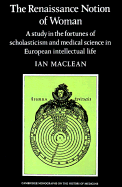 The Renaissance Notion of Woman
The Renaissance Notion of Woman 4 - Ethics, politics, social writings
Published online by Cambridge University Press: 01 June 2011
Summary
4.1.1 Any discussion of ethics and its related disciplines in the Renaissance is made difficult by the profusion of relevant texts, and the critical questions to which they give rise. Is there a European tradition of commentary-writing? Is this, if it exists at all, continuous from Aquinas to the seventeenth century? Is it possible to detect the influence of social, political and economic forces in commentaries – in other words, do the Reformation, the variety of forms of government in Europe, contemporary examples of female rule and economic activity by women affect the exegesis? Do Renaissance scholars attempt to see woman as described by Aristotle in historical or sociological terms? To what degree are commentaries affected by new textual discoveries, textual emendation and the study of the Greek as well as the Latin text? What is the relationship between contemporary political and moral philosophy (Machiavelli, Bodin, Montaigne, Vives) and the commentaries of Aristotle's works? To what degree does the content of the commentary vary according to the intended readership and pedagogical demands? It may not be possible in the confines of this investigation to provide satisfactory answers to all, if any, of these questions, but they should be borne in mind, as they form the critical basis of this enquiry.
4.1.2 The practice of producing expositions, commentaries and scholia as adjuncts to the ethical, political and ‘economic’ texts of Aristotle is medieval in origin; indeed, Aquinas's commentaries are still known and quoted with respect in the seventeenth century.
- Type
- Chapter
- Information
- The Renaissance Notion of WomanA Study in the Fortunes of Scholasticism and Medical Science in European Intellectual Life, pp. 47 - 67Publisher: Cambridge University PressPrint publication year: 1980
